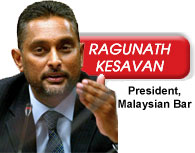By Ding Jo-Ann | The Nut Graph

IF Selangor’s Freedom of Information (FOI) bill is made law, how useful will it be in helping the public gain access to information held by the government? The Pakatan Rakyat (PR) government tabled the bill for its first and second reading on 14 July 2010, and a select committee will now be collating feedback and working out its implementation.
Many have heralded the bill’s introduction as an important first step for FOI. After all, the Malaysian government has an ingrained culture of secrecy. A government circular, in fact, forbids civil servants from divulging any facts about the government’s functioning.
Additionally, government officials have become accustomed to classifying anything they do as “secret” under the Official Secrets Act (OSA). All sorts of documents – from landslide reports, to toll and water concession agreements, to results of corruption investigations – have been stamped secret. Calling government departments sometimes feels like a game of “pass the parcel”, where you are an unwanted package that is handed from one official to another before being placed in a corner and completely forgotten.
While Selangor’s initiative is significant, many have pointed out that the bill does not go far enough in promoting transparency in the current opaque environment. Indeed, any law that will now make it compulsory for civil servants to disclose instead of conceal information must be crystal clear in its intention and implementation. There must be no convenient loopholes or backdoor ways to avoid disclosing information that the public has a right to know.
Even where national security or confidentiality is involved, these interests should be weighed against the harm to public interest due to non-disclosure. Hence, any refusal to disclose information must be accompanied by a proper explanation which can be appealed right up to the courts.
So what should the select committee be looking out for as it goes around collating information on how this bill will be applied? A few problematic sections in the draft bill are listed below:
Deemed rejected
The bill currently states that any request for information must be answered within 30 days, or seven if it’s a matter of life and death. However, it says that if no answer is forthcoming within the stipulated time, then the application is deemed rejected. This conflicts with another clause which states that applicants must be informed of the reasons any application is refused. Given that government departments can be relatively slow in responding, any such provision would not serve the public interest.
Reason for request
The FOI draft bill requires applicants to state the reason why they are applying for the information. If the information is used for purposes other than those stated in the application, the applicant can be fined up to RM50,000 or jailed up to five years.
This requirement is unnecessarily onerous. A right to know is a right to know. If the government is serious about the public gaining access to information it holds, it should not require applicants to justify why they are making any request.
In the UK, for example, no such requirement is stipulated in their Freedom of Information Act. In fact, applicants under the UK law need not even use a prescribed government form to make any request under the FOI Act. The public can just send a fax or even an e-mail citing the information required.
No court appeal
The government’s refusal to disclose information can be appealed to the Appeal Board, according to the bill. The appointments process of Appeal Board members has already been criticised because it will be done by the state authority, instead of an independent appointments panel. Moreover, the draft enactment states that the Appeal Board’s decisions will be final. Dissatisfied applicants cannot bring the matter before the courts for further review.
Any first-year law student would know that the three arms of government – the executive, legislature and the judiciary – are meant to act as checks and balances on each other. If the judiciary is ousted from scrutinising the Selangor government’s decisions in implementing the FOI law, what does this say about the PR’s commitment to public accountability?
Such a clause would make the PR no different from the Barisan Nasional (BN). The BN government has enacted similar clauses barring the courts from scrutinising minister’s decisions under the Internal Security Act, OSA and Printing Presses and Publications Act.
 Leaving a legacy
Leaving a legacy
Having said all that, it is still commendable of the PR government to introduce the FOI bill and open it up for public consultation and debate. It is hoped that these, and other concerns about the loopholes available for the government to subvert the bill’s intention, will be conclusively addressed.
After all, in the event that the PR loses Selangor in the next state election, they must ensure that the FOI law they enact is strong enough to compel the next government to operate an open government. It will also be heartening if the PR governments in Penang, Kelantan and Kedah introduced similar bills.
So, what are your thoughts about the FOI bill? When and if the FOI bill becomes law, what would you like to know from the Selangor government? Tell us in six words. Here are some of our thoughts:
Deborah Loh:
Parts of bill don’t make sense.
Lazy officers just wait 30 days.
Still a good effort, but anti-climatic.
Disclose 20-year development plans for Selangor!
Can FOI stop condo building frenzy?
Ding Jo-Ann:
Ouster clause no different from BN.
What about Penang, Kedah and Kelantan?
Federal government – time to play catch-up.
Will ask about traffic management plan.
BN opposition: unclear about FOI concept.
Gan Pei Ling:
See! Water leaking through bill’s loopholes.
Jacqueline Ann Surin:
Disappointing, PR, really disappointing. Do better!
What’s this? PR exercise for FOI?
Why weren’t best FOI practices incorporated?
I want public water concession agreements.
PR diberi peluang. Tetapi bazirkan peluang.
BN whitewashes ISA amendments. PR FOI.
Koh Lay Chin:
PR ke BN, bacalah fine print.
Thank you, but we would’ve waited.
Please don’t push a half-hearted bill.
Lainie Yeoh:
PR let downs are familiar now.
Some freedoms missing in FOI bill.
Certain parts look more like BN’s.

IF Selangor’s Freedom of Information (FOI) bill is made law, how useful will it be in helping the public gain access to information held by the government? The Pakatan Rakyat (PR) government tabled the bill for its first and second reading on 14 July 2010, and a select committee will now be collating feedback and working out its implementation.
Many have heralded the bill’s introduction as an important first step for FOI. After all, the Malaysian government has an ingrained culture of secrecy. A government circular, in fact, forbids civil servants from divulging any facts about the government’s functioning.
Additionally, government officials have become accustomed to classifying anything they do as “secret” under the Official Secrets Act (OSA). All sorts of documents – from landslide reports, to toll and water concession agreements, to results of corruption investigations – have been stamped secret. Calling government departments sometimes feels like a game of “pass the parcel”, where you are an unwanted package that is handed from one official to another before being placed in a corner and completely forgotten.
While Selangor’s initiative is significant, many have pointed out that the bill does not go far enough in promoting transparency in the current opaque environment. Indeed, any law that will now make it compulsory for civil servants to disclose instead of conceal information must be crystal clear in its intention and implementation. There must be no convenient loopholes or backdoor ways to avoid disclosing information that the public has a right to know.
Even where national security or confidentiality is involved, these interests should be weighed against the harm to public interest due to non-disclosure. Hence, any refusal to disclose information must be accompanied by a proper explanation which can be appealed right up to the courts.
So what should the select committee be looking out for as it goes around collating information on how this bill will be applied? A few problematic sections in the draft bill are listed below:
Deemed rejected
The bill currently states that any request for information must be answered within 30 days, or seven if it’s a matter of life and death. However, it says that if no answer is forthcoming within the stipulated time, then the application is deemed rejected. This conflicts with another clause which states that applicants must be informed of the reasons any application is refused. Given that government departments can be relatively slow in responding, any such provision would not serve the public interest.
Reason for request
The FOI draft bill requires applicants to state the reason why they are applying for the information. If the information is used for purposes other than those stated in the application, the applicant can be fined up to RM50,000 or jailed up to five years.
This requirement is unnecessarily onerous. A right to know is a right to know. If the government is serious about the public gaining access to information it holds, it should not require applicants to justify why they are making any request.
In the UK, for example, no such requirement is stipulated in their Freedom of Information Act. In fact, applicants under the UK law need not even use a prescribed government form to make any request under the FOI Act. The public can just send a fax or even an e-mail citing the information required.
No court appeal
The government’s refusal to disclose information can be appealed to the Appeal Board, according to the bill. The appointments process of Appeal Board members has already been criticised because it will be done by the state authority, instead of an independent appointments panel. Moreover, the draft enactment states that the Appeal Board’s decisions will be final. Dissatisfied applicants cannot bring the matter before the courts for further review.
Any first-year law student would know that the three arms of government – the executive, legislature and the judiciary – are meant to act as checks and balances on each other. If the judiciary is ousted from scrutinising the Selangor government’s decisions in implementing the FOI law, what does this say about the PR’s commitment to public accountability?
Such a clause would make the PR no different from the Barisan Nasional (BN). The BN government has enacted similar clauses barring the courts from scrutinising minister’s decisions under the Internal Security Act, OSA and Printing Presses and Publications Act.

('Top secret' by spekulator / sxc.hu)
Having said all that, it is still commendable of the PR government to introduce the FOI bill and open it up for public consultation and debate. It is hoped that these, and other concerns about the loopholes available for the government to subvert the bill’s intention, will be conclusively addressed.
After all, in the event that the PR loses Selangor in the next state election, they must ensure that the FOI law they enact is strong enough to compel the next government to operate an open government. It will also be heartening if the PR governments in Penang, Kelantan and Kedah introduced similar bills.
So, what are your thoughts about the FOI bill? When and if the FOI bill becomes law, what would you like to know from the Selangor government? Tell us in six words. Here are some of our thoughts:
Deborah Loh:
Parts of bill don’t make sense.
Lazy officers just wait 30 days.
Still a good effort, but anti-climatic.
Disclose 20-year development plans for Selangor!
Can FOI stop condo building frenzy?
Ding Jo-Ann:
Ouster clause no different from BN.
What about Penang, Kedah and Kelantan?
Federal government – time to play catch-up.
Will ask about traffic management plan.
BN opposition: unclear about FOI concept.
Gan Pei Ling:
See! Water leaking through bill’s loopholes.
Jacqueline Ann Surin:
Disappointing, PR, really disappointing. Do better!
What’s this? PR exercise for FOI?
Why weren’t best FOI practices incorporated?
I want public water concession agreements.
PR diberi peluang. Tetapi bazirkan peluang.
BN whitewashes ISA amendments. PR FOI.
Koh Lay Chin:
PR ke BN, bacalah fine print.
Thank you, but we would’ve waited.
Please don’t push a half-hearted bill.
Lainie Yeoh:
PR let downs are familiar now.
Some freedoms missing in FOI bill.
Certain parts look more like BN’s.



 1 Ogos 2010 menandakan ulangtahun ke-50 berkuatkuasanya Akta Keselamatan Dalam Negeri 1960 (AKDN). AKDN membenarkan kuasa menahan seseorang tanpa perlu dibicarakan yang melanggar hak asasi untuk dianggap tidak bersalah sehinggalah dibuktikan bersalah.
1 Ogos 2010 menandakan ulangtahun ke-50 berkuatkuasanya Akta Keselamatan Dalam Negeri 1960 (AKDN). AKDN membenarkan kuasa menahan seseorang tanpa perlu dibicarakan yang melanggar hak asasi untuk dianggap tidak bersalah sehinggalah dibuktikan bersalah. 






















